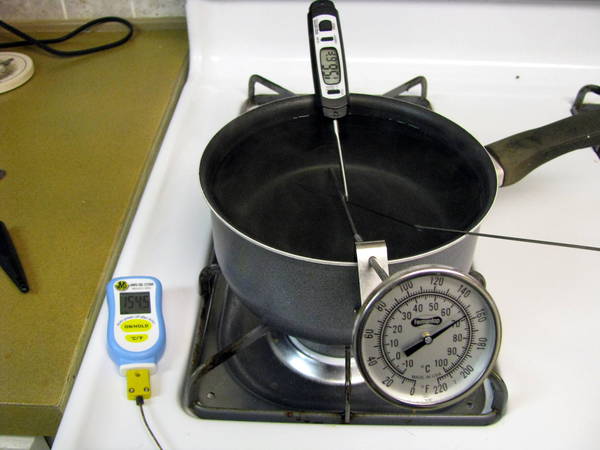Here is what I recently got to replace all the cheap crappy digital thermometers I have been using. Found a good deal on it so I hope it lasts and works good. It look like the MTC that thermoworks is selling only it is a different color and has a different logo on it. The initial tests look good it's right on at freezing but it was only reading 209-210 in boiling water. Not sure what to think of that. It was very consistent in the boiling water unlike the taylor digital that was supposed to be water resistant. Obviously it isn't even close since I can see moisture fog up the inside of the display and as soon as it gets too much moisture in it, it starts giving all kinds of bad readings.
Details are I found it on ebay under JMS Type K thermocouple, but I bought it directly from the seller NOT using ebay. The guy was very nice, answered my questions and got it to me very quickly. I paid $30.50 shipped with a wire thermocouple that will need some modification to be useful in liquids. I also found a good deal on a 12" type K probe from ebay for $10 shipped. So my total cost in it is $40.50 with the probe.
Anyway here are pictures of my initial tests.
With wire thermocouple

With Probe

In Ice

Details are I found it on ebay under JMS Type K thermocouple, but I bought it directly from the seller NOT using ebay. The guy was very nice, answered my questions and got it to me very quickly. I paid $30.50 shipped with a wire thermocouple that will need some modification to be useful in liquids. I also found a good deal on a 12" type K probe from ebay for $10 shipped. So my total cost in it is $40.50 with the probe.
Anyway here are pictures of my initial tests.
With wire thermocouple

With Probe

In Ice






























![Craft A Brew - Safale BE-256 Yeast - Fermentis - Belgian Ale Dry Yeast - For Belgian & Strong Ales - Ingredients for Home Brewing - Beer Making Supplies - [3 Pack]](https://m.media-amazon.com/images/I/51bcKEwQmWL._SL500_.jpg)































